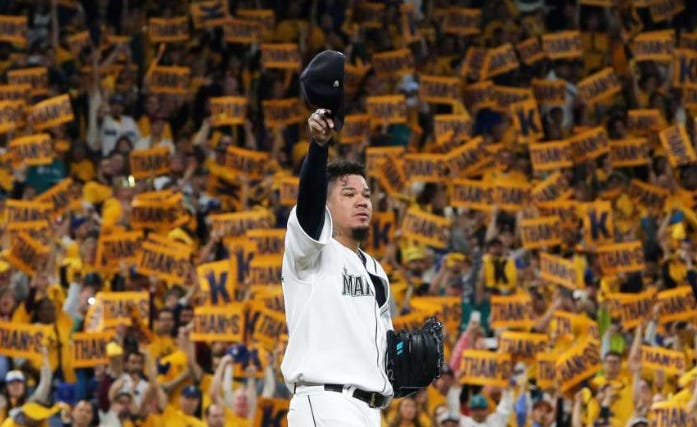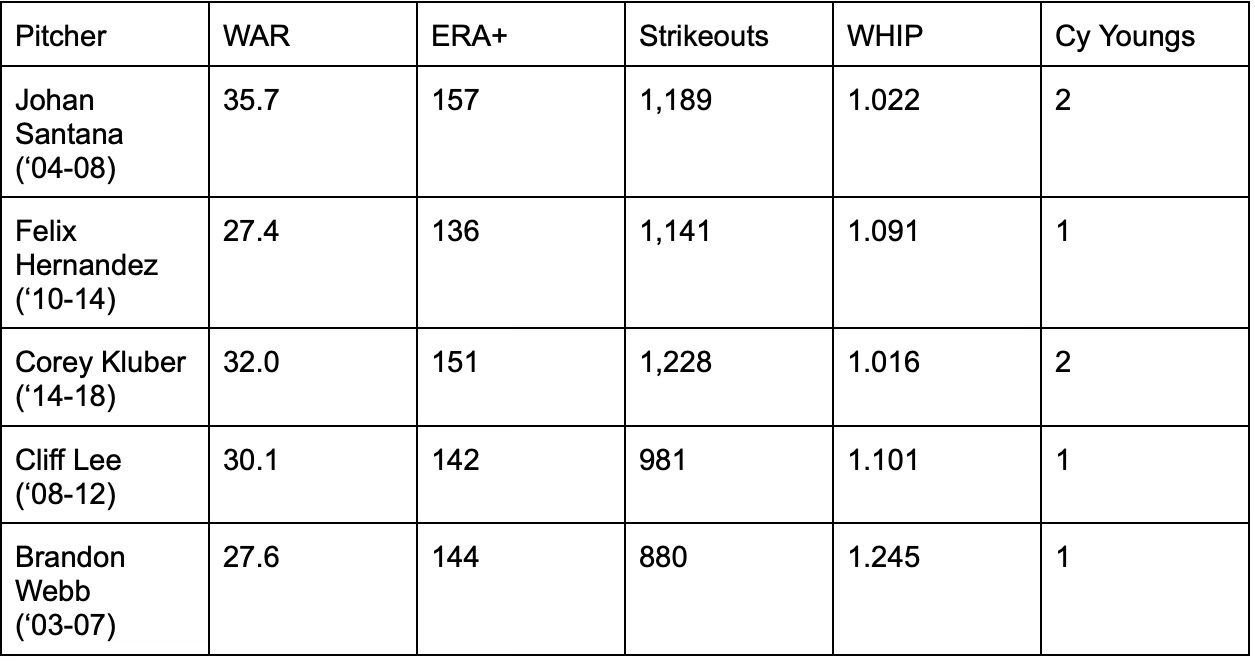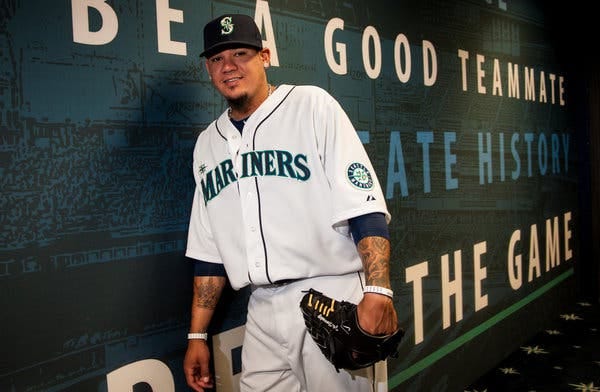Felix Hernandez finds himself as the latest promising starter who wound up falling short on a number of career statistics; a 1980s shot across the bow instead of a 1990s workhorse. From 2009-2015, a superb seven year stretch, Felix looked every bit a Hall of Famer. Sadly, he turned 30 and (as is too common) he struggled to keep up with his changing body, and quickly deteriorated. After a dreadful age-33 season Felix retired.
That is not to say that short career starters cannot make the Hall of Fame; in fact several examples exist from Dizzy Dean to Roy Halladay. So the game is not over, but short career pitchers need to really crack a punch.
Was Felix Hernandez ever Great?
Yes, Felix won a Cy Young in 2010 at the tender age of 24 despite only winning 13 games. At the time Felix’s win sparked what was viewed as the end of the win. C.C. Sabathia, who won 21 games, finished a distant 3rd marking the second straight season where the win leader lost to a superior pitcher. Overall in his career Felix pitched another two seasons where he conceivably could have won a Cy Young: 2009, where he fell a distant 2nd to Zack Greinke’s magnum opus, and 2014 where he narrowly lost to Corey Kluber.
The question with Felix is not whether he was great: it’s grading his peak compared to other pitchers of his era. While Felix was certainly a superb pitcher: he was not particularly close to the best pitcher of his era. Johan Santana, who dominated from 2002-2010, won two Cy Youngs (and should have won a 3rd but lost out to Bartolo Colon...who won 21 games) was better. I would argue that Corey Kluber, at his best, was also a better pitcher, along with a few others. Here’s a few pitchers and some statistics over a 5 year period:
This group of pitchers fell under a similar category for me: they all won a Cy Young (or more), they all had short careers (fewer than 3,000 innings, and 200 wins) but were all ace pitchers at their best. As we can see: Johan Santana dominates, and Santana has been compared to Sandy Koufax at his best. Felix’s peak bears more resemblance to the other pitchers in this group. The Brandon Webb comparison sticks out to me.
If we compare Felix to historical peaks he still falls short. His WAR7, the peak component of Jay Jaffe’s JAWS metric, ranks Felix 110th all time at 38.5 bWAR. Granted: this metric still favors older pitchers who threw more innings. However, even among modern pitchers it looks weak. A few modern pitchers who rank ahead of Felix:
-Doc Gooden (105th)
-Chuck Finley (100th)
-Cliff Lee (98th)
-Orel Hershiser (95th)-Bret Saberhagen (79th)
-David Cone (76th)-Johan Santana (63rd)
-Kevin Brown (61st)
What do these pitchers have in common? They all fell off the BBWAA ballot, with only Orel Hershiser even making it to a second ballot. Personally, I do not see a big reason why Felix would be considered better than any of these pitchers. He did lead the league in ERA twice, but this is at least partially a function of playing in Seattle. He never led the league in ERA+, and plenty of other pitchers have done this without recognition. Johan Santana did so three times, and still fell off the ballot.
This is important because while Felix did have a good peak, better than many Hall of Famers: that’s all he has to his case.
Did Felix Hernandez have Staying Power?
No, Felix turned 30 and promptly fell off a cliff. He did pitch 2,700 innings in his career, but this is a function of debuting at 19. Felix never posted a good season after turning 30, he could not even post an average one and for this reason he fell well short of 200 wins, 50 bWAR and 3,000 strikeouts.
This is the biggest problem for Felix and the Hall of Fame. His peak is strong, but not historically so; and his career is simply not particularly long. As a result Felix does not fit in well with other Hall of Famers. If we look at some other Hall of Fame metrics we see this; for instance Bill James’ Hall of Fame Monitor (which awards points to pitchers for various accomplishments in their career or in a single season) has Felix at only 67, the average Hall of Famer is at least 100. His Black Ink (a metric which measures how often a player led the league in important stats like ERA, innings pitched, and strikeouts) has Felix at only 28, the Hall of Fame average is 50. Gray Ink, a similar metric for ranking within the top 10 in your league, has Felix at 138 (Hall of Fame average 185).
Again: Felix is short of historical peers for the Hall of Fame.
Was Felix Hernandez an Inalienable Part of Baseball History
No. Felix did win a Cy Young, and I think his win is of historic significance as he beat out a 21 game winner, but otherwise he does not stand out. He never pitched in October, and spent all of his career on mediocre Seattle teams. He did play a big part in Seattle’s history, although the Mariners have not seen fit to retire his number, but that’s not enough for me to grade him highly on this scale.
Conclusion
I think there is room in the Hall of Fame for more starters with short careers. However, I think Felix Hernandez is not the right candidate for that, and I fear voters are erring in supporting Felix when better pitchers presented themselves on the ballot. Johan Santana was a better pitcher than Felix, Cliff Lee (at his best) was at least as good as Felix, Corey Kluber (at his best, in fewer years) was better than Felix. Chris Sale, who is currently active, is better than Felix Hernandez. Other short career pitchers played a bigger part in baseball history, like Doc Gooden. Orel Hershiser was a big part of both Dodgers and Indians history, and was better at his peak.
To linger on this last point a bit longer, while Felix did post a remarkable peak: there are different levels of remarkable. Felix indeed was stellar over his peak: his peak is not that different than numerous other pitchers who we’ve considered, and rejected, for the Hall of Fame. If I were to attempt to make a new standard for ‘peak’ starters: I would ask that we find a better standard to consider than Felix.
My proposed pitcher would be Johan Santana. For a 5 year stretch (2004-2008) he was the best pitcher in baseball, and the best pitcher in baseball in at least 3 individual seasons. He won two Cy Young Awards, and got robbed out of a third. He led the league in ERA 3 times, WHIP 4 times, strikeout rate 3 times, innings twice and wins once. This level of dominance, in my view, can be defended as being Hall of Fame worthy.
To me this becomes more an emphasis on what Baseball-Reference calls “Black Ink” or the count of how often a player leads the league in certain statistical categories (and its cousin: “Gray Ink” the count of the number of times a player ranks in the top 10 in statistical categories). This method does not fully replace traditional Hall of Fame analysis, while at least bringing us some way to build a separate standard. Overall: I do not think we want Felix to be the standard. It would distort the view of what a “Hall of Fame” starter is by too much. In my view this would then require us to revisit, on the top of my head: David Cone, Bret Saberhagen, David Stieb, Vida Blue, Doc Gooden, Johan Santana, among others. This is to say nothing of pitchers we’ve picked over for decades.
The 2025 ballot is less crowded than others, so I do think Felix has a good chance of sticking around, but I don’t see a strong argument for him. If Felix is worthy then a lot more starters who have been overlooked are also worthy. I don’t think that’s the standard voters want to set.
-Benjamin, J




